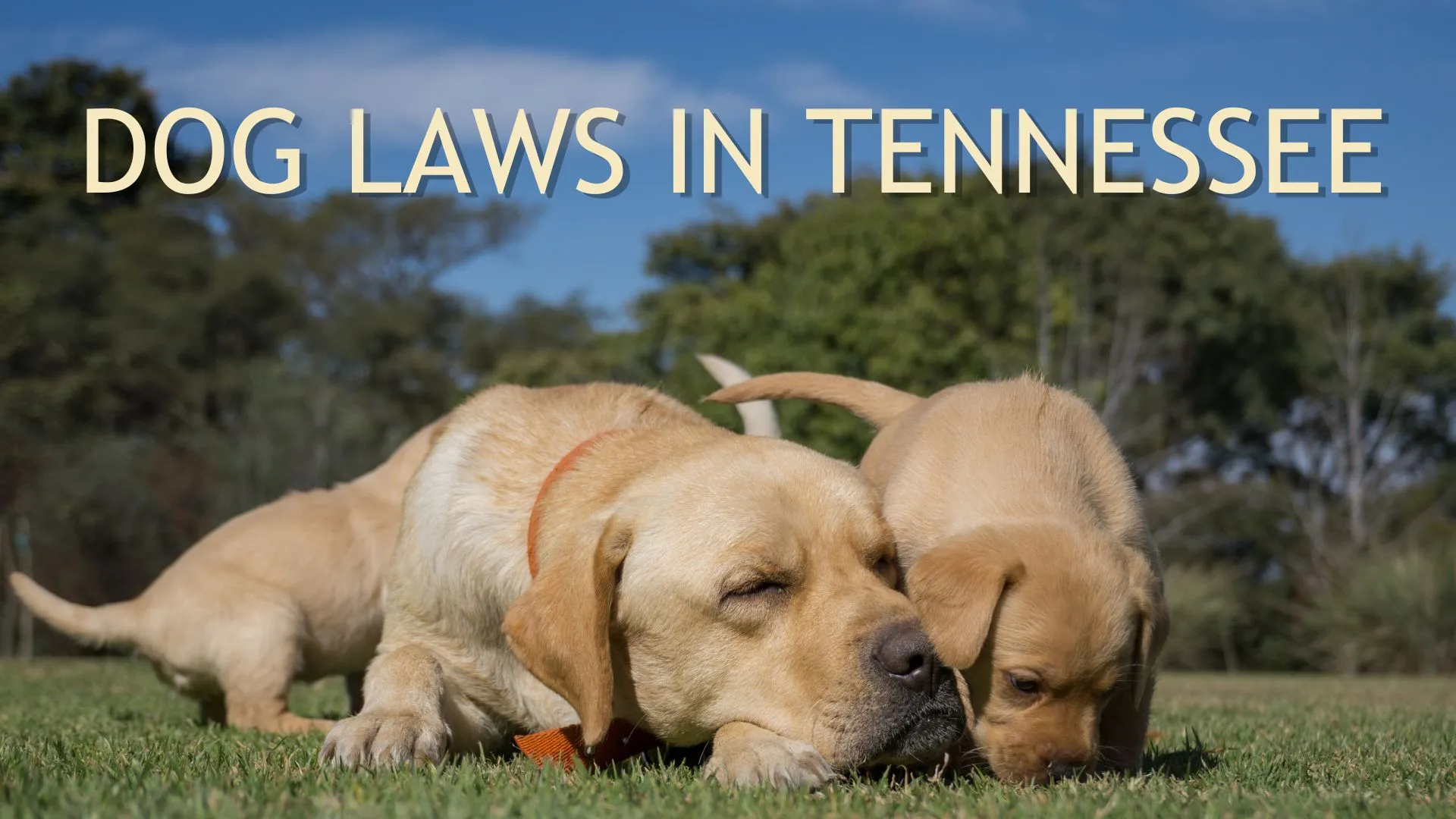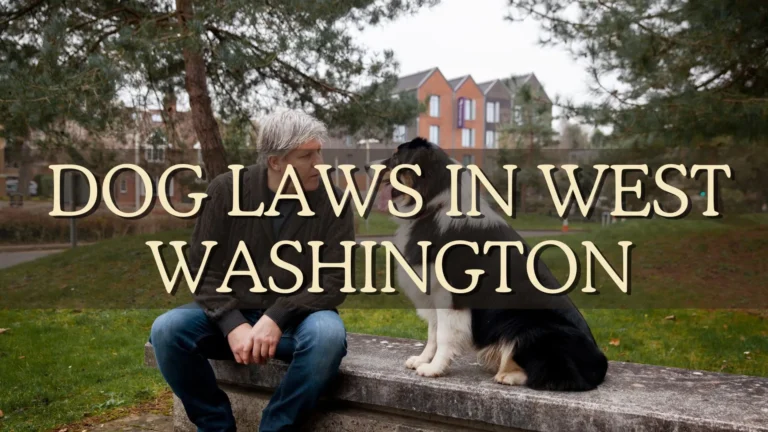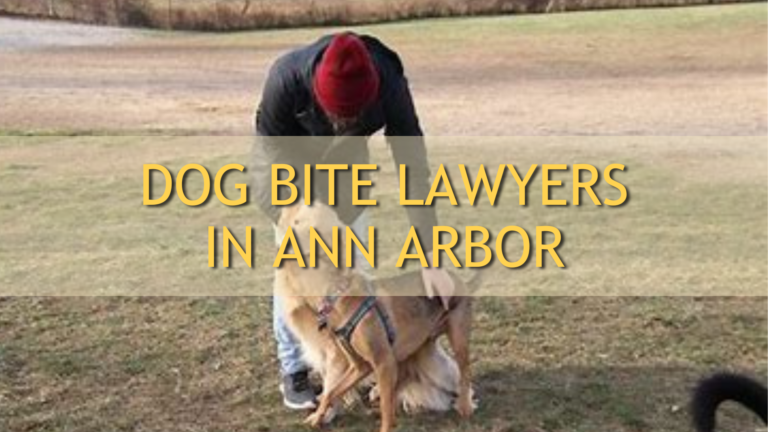Dog Laws in Tennessee
As a veterinarian, I treat all kinds of furry companions, and let me tell you, owning a dog is a joy! But with that joy comes responsibility. Did you know that according to the American Pet Products Association, over 69 million households in the USA own a dog?
That’s a lot of pups! And because our canine companions can sometimes find themselves in unexpected situations, understanding dog laws in your state is crucial. Here in Tennessee, dog laws cover a variety of areas, from keeping your pup under control to vaccination requirements. Let’s explore some key aspects of Tennessee dog law to ensure your furry friend and the community stay happy and healthy!
Table of Contents
Dog Bite Laws in Tennessee
Living in Tennessee with a furry friend is a wonderful experience. Whether you’re hiking through the Great Smoky Mountains or strolling down the vibrant streets of Nashville, your dog can be a cherished companion. However, with canine companionship comes responsibility, especially when it comes to understanding dog bite laws.
These laws are in place to protect both people and dogs, ensuring a safe and harmonious environment for everyone. This comprehensive guide will delve into the intricacies of Tennessee’s dog bite laws, empowering you to be a responsible dog owner and navigate potential legal situations.

Strict Liability vs. The One-Bite Rule
Tennessee’s dog bite laws are a unique blend of two primary legal concepts: strict liability and the one-bite rule. Understanding the difference between these two is crucial.
- Strict Liability: Under strict liability, a dog owner is held liable for any damages caused by their dog’s bite, regardless of the dog’s previous behavior or the owner’s knowledge of any aggressive tendencies. This means even if your dog has never bitten anyone before, you can still be held responsible for any injuries it inflicts.
- The One-Bite Rule: This common law principle suggests that a dog owner is only liable for a bite if the dog has a history of aggression or the owner knew (or should have known) about the dog’s propensity to bite. However, Tennessee has a significant twist on this rule.
The Residential Exception
Tennessee applies the one-bite rule with a crucial exception – the residential exception. This means the strict liability principle applies in most situations, except for dog bites that occur on the owner’s property (or other private property with permission).
Here’s how it breaks down:
- Public Place or Lawful Private Property: If a dog bite occurs in a public place (park, sidewalk, etc.) or on private property where the victim has legal permission to be (e.g., invited guest), strict liability applies. The owner is liable for the victim’s injuries regardless of the dog’s prior behavior.
- Private Property – The Residential Exception: This is where things get interesting. If the dog bite occurs on the owner’s property (or other private property with permission, like a friend’s house), the victim may have a harder time recovering damages. Here, the one-bite rule applies. The victim would need to prove:
- The dog has a history of aggression or the owner knew (or should have known) about the dog’s propensity to bite.
- The owner failed to take reasonable precautions to prevent the bite (e.g., not keeping the dog leashed or secured).
Influencing Dog Bite Liability
While the location of the bite plays a significant role, other factors can influence liability in a dog bite case:
- The Victim’s Actions: If the victim provoked the dog or was trespassing on private property, they might have difficulty recovering damages.
- The Dog’s Breed: While breed-specific legislation is uncommon in Tennessee, courts may consider the breed’s reputation for aggression as a factor, but it’s not a determining factor on its own.
- Leash Laws: Many Tennessee cities and counties have leash laws requiring dogs to be leashed in public spaces. Failing to leash your dog could strengthen the case against you in a bite incident.
Other Dog-Related Laws in Tennessee
Understanding dog bite laws is essential, but responsible dog ownership goes beyond that. Here’s a glimpse into other relevant Tennessee dog laws:
- Vaccinations: All dogs in Tennessee must be vaccinated against rabies and other core diseases.
- Licensing: Most cities and counties require dog licensing.
- Dangerous Dogs: Tennessee has specific regulations for dangerous dogs, which may include confinement requirements and additional insurance.
What to Do After a Dog Bite
If you or someone you know is bitten by a dog, follow these steps:
- Seek Medical Attention: This is crucial to ensure proper treatment and documentation of the injury.
- Report the Bite: Report the bite to animal control so they can investigate and ensure the dog’s vaccination status.
- Gather Evidence: If possible, take pictures of the bite wound and the scene of the incident. Collect witness statements if available.
- Consult an Attorney: An experienced personal injury attorney can help you understand your legal rights and determine the best course of action.
Dog Barking and Noise Laws in Tennessee
Living in Tennessee with a canine companion can be a joy. From exploring the scenic trails of the Cumberland Plateau to enjoying the bustling energy of Memphis, dogs enrich our lives. However, even the most well-behaved pup can become a source of disruption with excessive barking. This can lead to tension with neighbors and raise questions about noise ordinances.

Understanding Noise Ordinances
Tennessee doesn’t have a statewide noise ordinance specifically targeting dog barking. However, most cities and counties have their own noise ordinances that address excessive noise from various sources, including barking dogs. These ordinances typically define acceptable noise levels in decibels (dB) and set time restrictions for when noise can be disruptive.
The “Disturbance of the Peace” Standard
Even in the absence of a specific dog barking ordinance, Tennessee law prohibits “disturbance of the peace.” This means any noise, including persistent barking, that unreasonably disrupts the peace and quiet of a neighborhood can be considered a violation. Factors courts consider include:
- Frequency and Duration of Barking: Occasional barking is unlikely to violate the law. However, frequent or prolonged barking, especially during nighttime hours, can be considered a disturbance.
- Reasonableness: Courts consider the reason behind the barking. If the barking is triggered by a legitimate threat or intruder, it’s less likely to be a violation.
- Impact on Neighbors: The severity of the disruption experienced by neighbors plays a crucial role.
Strategies for Addressing Excessive Barking
The best approach is to address excessive barking proactively to avoid potential legal issues and maintain good relations with your neighbors. Here are some helpful tips:
- Identify the Cause: Understanding why your dog is barking excessively is the first step towards addressing the issue. Common triggers include boredom, separation anxiety, fear, territorial behavior, or medical issues.
- Behavioral Training: Consider professional training to address the underlying cause of the barking. Certified trainers can teach your dog appropriate communication methods and reduce unwanted vocalizations.
- Environmental Enrichment: Ensure your dog has sufficient physical and mental stimulation. Provide them with toys, puzzles, and opportunities for exercise to prevent boredom-induced barking.
- Desensitization and Counterconditioning: If specific triggers cause the barking, work with a trainer to desensitize your dog to those triggers or teach them a new, more desirable response.
Legal Repercussions for Excessive Barking
If your dog’s barking continues to be a nuisance despite your efforts, you could face legal consequences, which may include:
- Citations and Fines: Depending on your city or county ordinance, you may receive a citation and a fine for each violation. Repeated offenses could escalate the fines.
- Court Orders: In severe cases, a court may order you to take specific steps to address the barking, such as enrolling your dog in training or utilizing specific deterrents.
- Animal Control Involvement: Animal control may be notified and could potentially take your dog into custody in extreme situations.
Preventing Barking Issues: Proactive Measures for Responsible Owners
Being a responsible dog owner goes beyond simply avoiding legal trouble. Here are some proactive steps to prevent excessive barking in the first place:
- Socialization: Socialize your dog from a young age to help them feel comfortable with people and other animals, reducing the likelihood of fear-based barking.
- Proper Exercise: Provide your dog with adequate daily exercise to tire them out and minimize boredom-related barking.
- Destructive Chewing Deterrents: Address any destructive chewing behavior that might trigger barking due to frustration or discomfort.
- Positive Reinforcement: Reward your dog for quiet behavior to encourage calmness and reduce the urge to bark excessively.
Additional Resources
Here are some helpful resources for Tennessee dog owners looking for more information on dog barking and noise ordinances:
- Tennessee Department of Agriculture – Division of Animal Welfare Website
- Your Local Animal Control Agency: Most city and county animal control agencies have websites or phone numbers listed for contacting them about noise complaints or dog training resources.
Dog Poop Disposal Laws in Tennessee
Tennessee boasts stunning landscapes, vibrant cities, and a strong sense of community. Responsible dog ownership is a vital part of maintaining that sense of community, and a crucial aspect of that responsibility is proper dog waste disposal. This guide dives deep into Tennessee’s dog poop disposal laws and empowers you to be a considerate dog owner who keeps your neighborhood clean and healthy.

A Statewide vs. Local Approach
Unlike some states, Tennessee doesn’t have a single, statewide law mandating dog waste disposal. However, most cities and counties within the state have enacted their own ordinances addressing this issue. This means the specific legalities of dog waste disposal can vary depending on your location.
Responsible Poop Scooping
While the specific wording of ordinances might differ, the underlying theme remains consistent throughout Tennessee – responsible dog owners must pick up after their pets. Here’s what this means in practice:
- Immediate Removal: You are legally obligated to remove your dog’s waste immediately after they defecate, regardless of the location (public or private property with permission).
- Proper Disposal: The waste must be disposed of in a sanitary manner. This typically involves placing it in a sealed poop bag and throwing it away in a designated trash receptacle. Flushing the waste directly down the toilet is generally not recommended as it can overload septic systems and contribute to water pollution.
Fines and Penalties for Non-Compliance
Failing to pick up after your dog can result in fines and penalties. The specific amount can vary but typically falls within the range of $25 to $100 per violation. Repeated offenses might lead to escalating fines or even court appearances.
The Importance of Responsible Poop Scooping
Responsible dog waste disposal goes beyond avoiding fines. Here’s why scooping the poop is crucial for a healthy and happy community:
- Public Health: Dog waste can harbor harmful bacteria and parasites that pose a health risk to humans and other animals. Proper disposal minimizes this risk.
- Environmental Protection: Dog waste left on the ground can pollute waterways when it rains. Scooping it prevents this contamination.
- Courtesy to Neighbors: No one enjoys stepping in dog poop. Being a responsible owner keeps your neighborhood clean and pleasant for everyone.
Finding the Scoop on Your Local Laws
While the importance of responsible dog waste disposal is consistent across Tennessee, the specifics of the law can vary by location. Here’s how to find the exact ordinance for your city or county:
- Municipal Website: Most city and county governments maintain websites with information on local ordinances. Search for keywords like “animal control,” “dog waste disposal,” or “pet regulations.”
- Animal Control Agency: Your local animal control agency can provide information on the specific dog waste disposal laws in your area. You can find their contact information online or through your city/county website.
- Tennessee Department of Agriculture – Division of Animal Welfare: While not a direct source for local ordinances, this website provides general information about responsible pet ownership in Tennessee.
Additional Considerations
Responsible dog waste disposal goes beyond simply picking up the poop. Here are some additional tips:
- Carry Poop Bags: Always have a readily available supply of poop bags on your walks. Look for biodegradable bags for a more eco-friendly option.
- Double Bagging: If you’re concerned about odor or leakage, consider using double bags for added security.
- Dispose of Bags Properly: Don’t leave poop bags lying around after use. Throw them away in designated trash receptacles.
- Be Mindful of Disposal Locations: Avoid disposing of poop bags near playgrounds, gardens, or water sources.
- Lead by Example: Encourage fellow dog owners to practice responsible waste disposal.
Dog Licensing Laws in Tennessee
Tennessee is a state overflowing with charm, from the vibrant streets of Memphis to the majestic peaks of the Great Smoky Mountains. And let’s not forget the furry companions who share our lives! Being a responsible dog owner in Tennessee goes beyond just belly rubs and playtime. It also involves understanding and complying with dog licensing laws. This comprehensive guide will equip you with the knowledge you need to navigate Tennessee’s dog licensing requirements, ensuring your furry friend is properly tagged and contributing to the well-being of all canines in the state.

The Importance of Dog Licensing
Dog licensing isn’t just about bureaucratic paperwork. It plays a vital role in several areas:
- Public Safety: Licensing helps animal control agencies track and reunite lost dogs with their owners. A registered dog with a tag is much more likely to find its way back home.
- Rabies Control: Dog licensing often coincides with rabies vaccination verification. This helps ensure a healthier canine population and minimizes the risk of rabies outbreaks.
- Funding for Animal Welfare Programs: Licensing fees can be a significant source of funding for animal shelters, spay/neuter initiatives, and other programs that benefit all dogs in the state.
Tennessee’s Dog Licensing Landscape
While Tennessee doesn’t have a single, statewide dog licensing law, most cities and counties within the state have enacted their own ordinances requiring dog licensing. This means the specific requirements and fees can vary depending on your location.
Licensing Fundamentals
Despite variations in local ordinances, some core principles apply to dog licensing in most Tennessee jurisdictions:
- Licensing Age: Puppies typically need to be licensed by a certain age, often around four months old.
- Annual Renewal: Licenses usually require renewal on a yearly basis.
- Proof of Rabies Vaccination: Most jurisdictions require proof of current rabies vaccination for dog licensing.
- Fees: The licensing fee can vary based on the dog’s age, sterilization status (spayed/neutered), and other factors.
Finding the Specifics for Your Location
Here’s how to pinpoint the exact dog licensing requirements in your Tennessee city or county:
- Municipal Website: Most local governments maintain websites with information on animal control ordinances. Search for keywords like “dog licensing,” “pet regulations,” or “animal control.”
- Animal Control Agency: Your local animal control agency will have all the details regarding dog licensing requirements, fees, and the application process.
- Tennessee Department of Agriculture – Division of Animal Welfare: While not a direct source for local ordinances, this website provides general information about responsible pet ownership in Tennessee.
Benefits of Prompt Dog Licensing
Beyond legal compliance, there are numerous advantages to promptly licensing your dog:
- Peace of Mind: Knowing your dog is properly identified increases the chances of a safe return if they become lost.
- Reduced Fees: Some jurisdictions offer discounts for early licensing or for spaying/neutering your dog.
- Supporting Animal Welfare: Licensing fees contribute to programs that benefit all dogs in your community.
The Licensing Process
The specific steps for obtaining a dog license may vary depending on your location. However, here’s a general outline to give you an idea:
- Gather Information: Have your dog’s proof of rabies vaccination readily available. Some locations may also require information about your dog’s breed and age.
- Locate the Application: Download the application form from your city/county website or obtain one from your local animal control agency.
- Complete the Application: Fill out the application form with your information and your dog’s details.
- Submit the Application and Pay Fees: Submit the completed application along with proof of vaccination and the corresponding fee to your local animal control agency or designated office. Some locations may allow for online licensing.
- Receive Your License Tag: Once your application is processed, you’ll receive your dog’s license tag in the mail or over the counter.
Maintaining Your Dog License
- Annual Renewals: Remember to renew your dog’s license on an annual basis to ensure they remain properly tagged. Many local governments offer renewal reminders via email or mail.
- Tag Attachment: Attach the dog’s license tag securely to their collar so it’s easily visible. This is crucial for identification purposes if your dog gets lost.
Dog Leash Laws in Tennessee
Tennessee boasts breathtaking landscapes, bustling cities, and a strong sense of community. Responsible dog ownership is a cornerstone of maintaining that community spirit, and leash laws play a vital role in ensuring safety and harmony for both our furry friends and our fellow Tennesseans. This comprehensive guide delves into Tennessee’s dog leash laws, empowering you to be a responsible dog owner and ensure your canine companion enjoys safe and legal outings.

The Statewide Framework with Local Variations
Tennessee has a statewide leash law that serves as a foundation for dog leash regulations across the state. However, it’s crucial to remember that most cities and counties within Tennessee have enacted their own, more specific leash ordinances. These local ordinances can build upon or modify the state law, so understanding both is essential.
The Tennessee State Leash Law
Here’s a breakdown of the key points outlined in the Tennessee state leash law:
- Leash Requirement: All dogs in public places must be on a leash no longer than six (6) feet in length. A public place is defined as any area accessible to the public, including parks, sidewalks, streets, and public trails.
- Physical Control: Even if not on a leash, the dog must be under the owner’s immediate control by means sufficient to restrain the animal.
- Exceptions: The state law allows for exceptions to leash requirements in specific situations, such as:
- Designated Off-Leash Areas: Many cities and counties have designated dog parks or off-leash areas where dogs can run freely under their owner’s supervision. Always adhere to the specific rules of these designated areas.
- Field Trials or Hunting: Dogs participating in sanctioned field trials or hunting activities may be exempt from leash requirements.
- Working Dogs: Certain working dogs performing their duties, such as service animals or law enforcement K-9s, may be exempt from leash laws.
Local Leash Ordinances
While the state leash law provides a baseline, most Tennessee cities and counties have their own, more detailed leash ordinances. These local ordinances can be stricter or more lenient than the state law.
Here’s why understanding local leash ordinances is crucial:
- Variations in Requirements: Local ordinances may have specific leash length limitations (shorter than 6 feet), define public places more extensively, or specify leash requirements in specific areas like beaches or trails.
- Fines and Penalties: Fines for leash violations can vary significantly depending on the city or county.
- Additional Regulations: Local ordinances may have additional regulations regarding dog control in public places, such as requiring waste disposal bags or prohibiting aggressive dogs.
Specific Leash Laws for Your Location
Here’s how to pinpoint the exact dog leash laws in your Tennessee city or county:
- Municipal Website: Most local governments maintain websites with information on animal control ordinances. Search for keywords like “dog leash law,” “pet regulations,” or “animal control.”
- Animal Control Agency: Your local animal control agency can provide detailed information on leash requirements, designated off-leash areas, and potential fines.
- Tennessee Department of Agriculture – Division of Animal Welfare: While not a direct source for local ordinances, this website provides general information about responsible pet ownership in Tennessee.
Responsible Leash Use
Responsible leash use goes beyond legal compliance; it promotes a safer and more enjoyable environment for everyone:
- Safety for Dogs: Leashes prevent dogs from running into traffic, approaching strangers unexpectedly, or getting into fights with other dogs.
- Safety for People: Leashes help control dog behavior and minimize the risk of bites or injuries.
- Community Harmony: Leashes ensure everyone feels comfortable using public spaces without worry about loose dogs.
Tips for Responsible Leash Use
Here are some pointers for responsible leash use during walks with your furry friend:
- Choose the Right Leash: Select a leash that’s strong enough for your dog’s size and temperament. Consider retractable leashes for added flexibility but ensure you maintain control.
- Maintain Slack, But Not Too Much: Allow your dog some freedom to explore while keeping them close enough to control their behavior. Avoid letting the leash go slack entirely.
- Practice Leash Manners: Train your dog to walk calmly and loosely beside you on a leash.
- Be Aware of Your Surroundings: Pay attention to other people and dogs, and give them ample space if needed.
Dangerous Dog Laws in Tennessee
Tennessee is a state rich in beauty, from the rolling hills of Appalachia to the vibrant streets of Nashville. Responsible dog ownership is a vital part of maintaining a safe and harmonious environment for everyone in our communities. This includes understanding and potentially dealing with dangerous dogs. This comprehensive guide will explore Tennessee’s dangerous dog laws, empowering you to be a responsible dog owner and ensure the safety of yourself, your furry friend, and your neighbors.

What Makes a Dog “Dangerous” in Tennessee
Tennessee doesn’t have a single, definitive legal definition of a “dangerous dog.” However, the state and some local governments have established criteria that may classify a dog as dangerous. These criteria typically involve a dog’s history of aggression that results in:
- Serious Bodily Injury: This could include bites that break skin or cause significant lacerations, puncture wounds, or other injuries.
- Killing Another Animal: An unprovoked attack on another domestic animal that results in death could be considered a sign of dangerous behavior.
Determining Dangerous Dog Status
While the above criteria play a role, determining a dog’s dangerous status is often a multi-factored approach that may consider:
- Severity of the Attack: The extent of the injuries inflicted or the severity of the attack on another animal can influence the classification.
- Provocation: If a dog was provoked by aggressive behavior from another animal or human, it may be less likely to be deemed dangerous.
- Prior Incidents: A history of aggressive behavior, even without causing serious injury, might contribute to a dangerous dog designation.
- Breed: While breed-specific legislation is uncommon in Tennessee, courts may consider the breed’s reputation for aggression as a factor, but it’s not a determining factor on its own.
- Evaluation by Animal Control or Professionals: Animal control officers or qualified animal behaviorists may be involved in assessing the dog’s temperament and potential for future aggression.
State Law and Local Ordinances
Tennessee has a state law that allows circuit courts to order the destruction of a dog that attacks a human and causes death or serious bodily injury. However, most dangerous dog regulations are implemented through local ordinances enacted by cities and counties.
These local ordinances can vary significantly. Here’s what you might encounter:
- Dangerous Dog Designation: The process for getting a dog declared dangerous can vary, but it might involve an animal control investigation, a hearing, and potential involvement from a veterinarian or animal behaviorist.
- Confinement Requirements: Dogs deemed dangerous might be subject to specific confinement requirements, such as securely fenced yards, muzzles when outside, or limitations on public access.
- Liability Insurance: Some jurisdictions may require owners of dangerous dogs to carry additional liability insurance.
- Appealing a Dangerous Dog Designation: The owner typically has the right to appeal a dangerous dog designation through the local court system.
Preventing Dangerous Dog Situations
The best approach is to prevent dangerous dog situations from arising in the first place. Here are some key aspects of responsible dog ownership:
- Proper Training and Socialization: Enroll your dog in obedience training from a young age. Socialization with other animals and people helps them develop positive interactions.
- Understanding Body Language: Learn to recognize canine body language that signals fear, anxiety, or aggression.
- Supervision: Don’t leave your dog unattended around children or other animals unless you’re confident they can interact safely.
- Addressing Behavioral Issues: Seek professional help from a qualified animal behaviorist if your dog exhibits signs of aggression.
- Spay/Neutering: Spaying or neutering your dog can reduce territorial behavior and potentially lessen aggression.
Dog Health and Welfare Laws in Tennessee
Tennessee offers a beautiful backdrop for life with your canine companion. From the majestic peaks of the Great Smoky Mountains to the vibrant energy of Memphis, responsible dog ownership is essential for a thriving community. This guide delves into the legalities surrounding dog health and welfare in Tennessee, empowering you to provide the best possible care for your furry friend.

State and Local Regulations
Tennessee doesn’t have a single, comprehensive dog health and welfare law. Instead, regulations are established through a combination of:
- Tennessee State Statutes: These address specific aspects of animal welfare, including cruelty prevention and rabies control.
- Tennessee Department of Agriculture Rules: The Department of Agriculture promulgates regulations related to animal health, including requirements for transporting dogs.
- Local Ordinances: Many cities and counties in Tennessee enact their own ordinances addressing animal control, tethering restrictions, and other welfare concerns.
Core Principles of Dog Health and Welfare
While specific regulations might differ, some core principles underpin dog health and welfare laws across Tennessee:
- Prevention of Cruelty: Tennessee law prohibits acts of cruelty to animals, including neglect, torture, and unreasonable confinement.
- Rabies Vaccination: Rabies vaccination is mandatory for all dogs in Tennessee to protect public health and prevent the spread of this deadly disease.
- Minimum Standards of Care: Owners have a legal obligation to provide their dogs with basic necessities like adequate food, water, shelter, and veterinary care.
- Tethering Restrictions: Many localities have ordinances restricting how long and under what conditions a dog can be tethered outdoors.
Tennessee Statutes for Dog Health and Welfare
Here’s a closer look at some key Tennessee statutes related to dog health and welfare:
- Animal Cruelty Prevention: Tennessee Code Annotated § 39-14-201 defines animal cruelty and outlines penalties for violations. This includes failing to provide necessary food, water, care, or shelter.
- Rabies Control: Tennessee Code Annotated § 4-28-101 mandates rabies vaccination for all dogs over four months of age.
- Transporting Dogs: The Tennessee Department of Agriculture regulates the transportation of dogs for commercial purposes.
Local Ordinances
Due to the variation in local ordinances, it’s crucial to research the specific regulations in your Tennessee city or county. These ordinances might address:
- Tethering Restrictions: Some localities limit the duration and conditions for tethering dogs outdoors.
- Breed Restrictions: While uncommon, some cities or counties might have breed-specific restrictions.
- Fenced Yards: Certain areas might require fenced yards for dog owners.
- Waste Disposal: Local ordinances often mandate responsible dog waste disposal in public spaces.
Finding the Specific Laws for Your Location
Here’s how to pinpoint the exact dog health and welfare regulations in your Tennessee city or county:
- Municipal Website: Most local governments maintain websites with information on animal control ordinances. Search for keywords like “animal welfare,” “dog regulations,” or “animal control.”
- Animal Control Agency: Your local animal control agency can provide detailed information on specific ordinances, tethering restrictions, and any applicable fines.
- Tennessee Department of Agriculture – Division of Animal Welfare: While not a direct source for local ordinances, this website provides general information about responsible pet ownership in Tennessee.
Responsible Ownership for Optimal Dog Wellbeing
While legal compliance is crucial, responsible dog ownership encompasses more than just following the law. Here are some additional considerations for your dog’s health and happiness:
- Veterinary Care: Schedule regular checkups with a licensed veterinarian to ensure your dog’s health and receive preventive care like vaccinations.
- Nutritious Diet: Provide your dog with a balanced diet appropriate for their age, breed, and activity level.
- Exercise and Enrichment: Engage your dog in daily physical activity and mental stimulation to keep them healthy and prevent boredom-related behaviors.
- Safe Environment: Ensure your home and yard are safe for your dog, free from hazards like electrical cords, toxic plants, or escape routes.
- Positive Reinforcement Training: Use positive reinforcement training methods to teach your dog good manners and build a strong bond.
Dog Public Access Laws in Tennessee
Tennessee boasts breathtaking landscapes, bustling cities, and a strong sense of community. For many Tennesseans, their canine companions are cherished members of the family. Exploring the state’s natural beauty or enjoying a vibrant city with your dog can be a delightful experience. However, navigating public access with your furry friend requires understanding the legalities and courtesies involved. This comprehensive guide delves into dog public access laws in Tennessee, empowering you to be a responsible dog owner and ensure enjoyable outings for you and your pup.

The Public Access Landscape
Tennessee doesn’t have a single, statewide law governing dog access to public spaces. Instead, the rules for bringing your dog to public places are established by a combination of factors:
- State Statutes: Tennessee has some general laws related to service animals and public accommodations.
- Local Ordinances: Most cities and counties in Tennessee have their own ordinances outlining specific regulations for dog access in public areas like parks, beaches, and trails. These ordinances can vary significantly.
- Private Businesses: Individual businesses can establish their own policies regarding dogs on their premises.
Service Animal Laws
The Americans with Disabilities Act (ADA) protects the rights of individuals with disabilities to be accompanied by service animals in all public places and accommodations. Tennessee law recognizes service animals as defined by the ADA.
Here’s a breakdown of key points regarding service animals in Tennessee:
- Definition: A service animal is a dog that is individually trained to do work or perform tasks for a person with a disability.
- Public Access Rights: Service animals must be allowed to accompany their handlers in all public places, including restaurants, stores, government buildings, and public transportation.
- Documentation Requirements: Businesses cannot require proof of training or certification for service animals.
Public Access for Non-Service Animals
For non-service animals, public access rights depend heavily on local ordinances enacted by cities and counties. These ordinances can differ substantially, so it’s crucial to research the specific regulations in your area. Here are some general categories you might encounter:
- Dog Parks and Off-Leash Areas: Many localities have designated dog parks or off-leash areas where dogs can run freely under their owner’s supervision. Always adhere to the specific rules of these designated areas.
- Leash Requirements: Most public spaces require dogs to be on a leash of a certain length (often 6 feet) while under the owner’s control.
- Breed Restrictions: While uncommon, some areas might have breed-specific restrictions in public spaces.
- Prohibited Areas: Certain public spaces, like playgrounds or beaches, may be entirely off-limits to dogs.
Specific Public Access Laws for Your Location
Due to the variation in local ordinances, it’s important to understand the specific regulations for dog access in your Tennessee city or county. Here are some ways to find the details:
- Municipal Website: Most local governments maintain websites with information on animal control ordinances and park regulations. Search for keywords like “dog park,” “pet regulations,” or “animal control.”
- Park Signage: Public parks often have signage posted at entrances outlining leash requirements and any restrictions for dogs.
- Animal Control Agency: Your local animal control agency can provide detailed information on public access rules, leash requirements in different areas, and designated off-leash areas.
Responsible Dog Ownership for Public Enjoyment
Following the law is essential, but responsible dog ownership goes beyond legalities. Here are some key aspects to ensure enjoyable public outings with your dog:
- Leash Manners: Ensure your dog is well-trained on leash and walks calmly beside you, respecting the space of others.
- Waste Management: Always carry poop bags and dispose of your dog’s waste properly in designated trash receptacles.
- Voice Control: Maintain good voice control over your dog and respond promptly to commands to ensure your pup doesn’t disrupt others.
- Respecting Boundaries: Be mindful of posted signs and respect areas where dogs might not be allowed.
- Dog-Friendly Businesses: Look for businesses that explicitly welcome dogs or have outdoor seating areas where your furry friend can join you.
Dog Travel and Transportation Laws in Tennessee
Tennessee’s diverse landscapes, from the Great Smoky Mountains to the vibrant streets of Nashville, beckon adventure for both humans and their canine companions. Whether you’re planning a road trip across the state or venturing further afield, ensuring your furry friend travels safely and legally is paramount. This comprehensive guide delves into dog travel and transportation laws in Tennessee, empowering you to be a responsible pet owner and have a smooth journey with your pup.

The Legal Landscape
Tennessee doesn’t have a single, comprehensive set of laws governing dog travel within the state. However, there are some regulations and best practices to consider:
- Rabies Vaccination: Tennessee law mandates rabies vaccination for all dogs over four months of age. This is essential not only for public health but also for crossing state lines, as some states may have additional requirements.
- Health Certificates: While not always required for travel within Tennessee, some boarding facilities, campgrounds, or dog-friendly events may request a health certificate from a licensed veterinarian certifying your dog’s good health.
- Confinement and Safety: While there are no specific laws in Tennessee regarding dog restraint during car travel, animal cruelty laws prohibit transporting animals in a cruel or unsafe manner. Always consider using a crate, harness with tether, or pet barrier to ensure your dog’s safety and prevent distractions while driving.
Regulations for Traveling Beyond Tennessee
If you’re planning to travel outside Tennessee with your dog, additional regulations come into play:
- Rabies Vaccination Certificate: A current rabies vaccination certificate is typically required for crossing state lines. Requirements may vary depending on the destination state, so research their specific regulations beforehand.
- Health Certificates: Many states require a health certificate issued by a licensed veterinarian within a specific timeframe (often 30 days) before entry. The certificate may need to verify your dog’s health and freedom from certain diseases.
- USDA Interstate Certificate for Health Movement: For travel across several states or extended stays, you might need a USDA interstate certificate for health movement. This document requires additional veterinary examinations and paperwork.
Finding the Specific Requirements for Your Destination
Here’s how to pinpoint the exact dog travel requirements for your out-of-state destination:
- State Department of Agriculture Website: Most state government websites have dedicated sections for animal health regulations, including information for pet travel.
- USDA Animal and Plant Health Inspection Service (APHIS): The USDA APHIS website provides comprehensive information on interstate and international pet travel requirements.
Planning for a Safe and Comfortable Doggy Journey
Beyond legal compliance, here are some key considerations for a safe and comfortable dog travel experience:
- Acclimation: If your dog isn’t used to car rides, gradually introduce them with short trips and positive reinforcement.
- Preparation: Pack enough food, water, waste bags, medications (if applicable), and familiar items like your dog’s bed or favorite toy to reduce stress.
- Climate Control: Never leave your dog unattended in a parked car, especially during hot or cold weather. Maintain comfortable car temperatures and provide fresh air with frequent breaks.
- Exercise and Breaks: Schedule regular rest stops for your dog to eliminate, stretch their legs, and rehydrate.
- Leash and Identification: Always keep your dog on a leash during rest stops and ensure they have a collar with ID tags or a microchip for identification purposes.
Airline Travel Considerations
If your travel plans involve air travel, additional regulations and pet policies apply:
- Airline Research: Each airline has its own pet policies regarding size, breed restrictions, and transport requirements (in-cabin vs. cargo). Research the specific airline’s pet travel program well in advance.
- Reservations: Most airlines require reservations for transporting pets, so book your dog’s spot early, especially during peak travel times.
- Health Certificates and Crates: Airlines typically require a health certificate issued within a specific timeframe and a crate that meets specific size and ventilation standards.
Additional Considerations
- Public Transportation: Regulations for bringing dogs on public transportation like buses or trains vary by operator. Research their pet policies beforehand.
- Pet-Friendly Accommodations: Look for hotels, motels, vacation rentals, or campgrounds that explicitly welcome dogs and inquire about any size or breed restrictions.
Dog Housing and Accommodation Laws in Tennessee
Tennessee, with its vibrant cities and stunning natural landscapes, is a popular choice for both human and canine residents. For responsible pet owners, finding suitable housing that welcomes their furry friend is crucial. However, navigating the legalities and limitations surrounding dogs in housing can be confusing. This comprehensive guide delves into dog housing and accommodation laws in Tennessee, empowering you to find a home that suits both you and your pup.

Federal Fair Housing Act and Local Ordinances
There isn’t a single, overarching set of dog housing laws in Tennessee. Regulations regarding dogs in housing primarily stem from two sources:
- Federal Fair Housing Act (FHA): This federal law prohibits discrimination based on disability and includes protections for reasonable accommodations for service animals.
- Local Ordinances: Many cities and counties in Tennessee have their own ordinances that might address pet restrictions in housing, breed limitations, or specific requirements for dog owners.
Fair Housing Act (FHA) and Service Animals
The FHA protects the rights of individuals with disabilities to live in housing that allows service animals. Here’s a breakdown of key points regarding service animals in housing:
- Definition: A service animal is a dog that is individually trained to do work or perform tasks for a person with a disability.
- Reasonable Accommodation: Landlords are generally required to make reasonable accommodations for service animals, which could include waiving no-pet policies or breed restrictions.
- Documentation Requirements: Landlords cannot require proof of training or certification for service animals, but they can ask for documentation establishing the resident’s disability and the service animal’s necessity.
Local Ordinances: Importance of Research
While the FHA offers some protections for service animals, it doesn’t apply to all dog housing situations. Here’s why understanding local ordinances is crucial:
- Pet Restrictions and Breed Bans: Many rental properties and some homeowners’ associations (HOAs) have pet policies that might limit the number of pets allowed, impose size restrictions, or even ban certain breeds.
- Deposit Requirements: Landlords might require additional pet deposits from tenants with dogs.
Specific Housing Laws for Your Location
Due to the variation in local ordinances and individual housing policies, it’s important to research the specific regulations in your desired Tennessee location. Here are some ways to find the details:
- Rental Listing Information: Most rental property listings online or through property management companies will clearly state pet policies, including any restrictions or fees.
- HOA Rules and Regulations: If you’re considering a property within a homeowners’ association, obtain their rules and regulations to understand any pet restrictions or requirements.
- Local Government Websites: Some city or county websites might have information on animal control ordinances that could indirectly impact dog housing regulations.
Responsible Dog Ownership for a Happy Home
While legal compliance is essential, responsible dog ownership is vital for maintaining a harmonious living environment:
- Transparency: Be upfront with landlords or property managers about your dog, including breed, size, and temperament.
- Training and Socialization: Ensure your dog is well-trained and socialized to minimize noise complaints or disruptions for neighbors.
- Waste Management: Always clean up after your dog on walks and in common areas.
- Respectful Behavior: Be mindful of noise levels and ensure your dog doesn’t damage the property.
Additional Considerations
Here are some tips for finding dog-friendly housing in Tennessee:
- Search Tools: Many online rental platforms allow you to filter searches for pet-friendly properties.
- Dog-Friendly Apartment Complexes: Some apartment complexes cater specifically to dog owners and might offer amenities like dog parks or walking areas.
- Private Landlords: Some private landlords might be more open to negotiating pet policies with responsible dog owners.
Dog Adoption and Sale Laws in Tennessee
Tennessee, with its rolling hills and vibrant cities, is a state brimming with opportunity for both humans and canines. For many Tennesseans, welcoming a dog into their lives brings immense joy and companionship. Whether you’re considering adopting a dog in need of a loving home or purchasing a purebred pup from a breeder, understanding the legalities involved is essential. This comprehensive guide delves into dog adoption and sale laws in Tennessee, empowering you to make a responsible and informed decision when welcoming your furry friend.

Responsible Rescue and Rehoming
Tennessee boasts a network of dedicated animal shelters and rescue organizations working tirelessly to care for homeless and abandoned dogs. Adopting a dog from a shelter or rescue can be a rewarding experience, offering a second chance to a deserving animal. Here’s what to know about the typical adoption process in Tennessee:
- Licensing: Shelters and rescues in Tennessee are typically required to be licensed by the Tennessee Department of Agriculture or local authorities. This ensures adherence to animal welfare standards.
- Adoption Process: The adoption process can vary, but it often involves an application, background check, meet-and-greet with the dog, and adoption fees.
- Spay/Neuter Requirements: Many shelters and rescues require adopted dogs to be spayed or neutered as a condition of adoption to help control pet overpopulation.
Tennessee Companion Animal Welfare Act & Licensing
The Tennessee Companion Animal Welfare Act establishes a framework for licensing and regulating animal shelters and rescues in the state. Here’s a breakdown of key points:
- Licensing Requirements: Professional breeders, reputable rescues, and anyone offering companion animals for adoption or sale require a valid license from the Tennessee Department of Agriculture.
- Inspections: Licensed facilities are subject to inspections to ensure compliance with animal welfare standards, including housing, sanitation, and veterinary care.
- Consumer Protections: The Act aims to protect consumers from unscrupulous breeders or sellers and promote responsible animal ownership practices.
Reputable Rescue Organizations and Shelters
When considering adoption, look for reputable shelters and rescue organizations in Tennessee. Here are some ways to identify responsible organizations:
- Licensing Status: Verify the shelter or rescue has a valid license from the Tennessee Department of Agriculture or local authorities.
- Facility Conditions: Look for clean, well-maintained facilities that prioritize animal welfare.
- Transparency: Reputable organizations are transparent about their adoption process, fees, and animal care practices.
- Online Reviews and Resources: Research online reviews and consult resources like the Tennessee Federation of Animal Welfare Organizations to find reputable shelters and rescues.
Laws for Breeders and Sellers
If you’re looking for a specific breed or pedigree, purchasing a dog from a breeder might be the right choice. Here’s what to know about dog sales in Tennessee:
- Licensing: Just like shelters and rescues, breeders and dog sellers in Tennessee must be licensed by the Tennessee Department of Agriculture.
- Sales Regulations: The Tennessee Companion Animal Welfare Act outlines regulations for the sale of dogs, including minimum age requirements for puppies and recordkeeping obligations for breeders and sellers.
- Health Considerations: Responsible breeders prioritize the health of their dogs. Ask about genetic testing, health clearances, and veterinary care provided to breeding stock and puppies.
Finding a Responsible Dog Breeder
When considering purchasing a puppy from a breeder, look for responsible breeders who prioritize the health and well-being of their dogs. Here are some tips:
- Breeder Reputation: Research the breeder’s reputation and seek recommendations from veterinarians or breed clubs.
- Facility Conditions: Visit the breeder’s facility to ensure clean, humane living conditions for the dogs.
- Health Testing: Reputable breeders conduct genetic testing and health clearances for their breeding stock to minimize the risk of hereditary diseases.
- Breeder Contracts: A responsible breeder will have a contract outlining the terms of the sale, health guarantees (if applicable), and buyer responsibilities.
Avoiding Puppy Mills
Puppy mills are commercial breeding operations that prioritize profit over the health and well-being of dogs. Here’s how to avoid supporting puppy mills:
- Beware of Low Prices: Extremely low prices for puppies can be a red flag for puppy mills.
- Online Marketplaces: Exercise caution when purchasing puppies online, as some platforms might facilitate sales from puppy mills.
- Directly Meet the Breeder: Meet the breeder in person and visit their facilities to assess the conditions in which the dogs are kept.
Dog Park and Recreation Laws in Tennessee
Tennessee’s diverse landscapes, from the Great Smoky Mountains to bustling city parks, offer endless opportunities for outdoor adventures. For many Tennesseans, their canine companions are cherished members of the family, and exploring these scenic areas together can be a delightful experience. However, navigating dog-friendly spaces and ensuring everyone enjoys a safe and positive experience requires understanding the legalities and courtesies involved. This comprehensive guide delves into dog park and recreation laws in Tennessee, empowering you to be a responsible dog owner and ensure enjoyable outings for you and your pup.

The Recreation Landscape
Tennessee doesn’t have a single, statewide set of laws governing dogs in public recreation areas. Instead, the rules for bringing your dog to parks, trails, and other outdoor spaces are established by a combination of factors:
- Local Ordinances: Most cities and counties in Tennessee have their own ordinances outlining specific regulations for dog access in public recreation areas. These ordinances can vary significantly, so it’s crucial to research the specific rules in your area.
- State Parks and Forests: Tennessee State Parks and Forests have their own regulations regarding dogs, which might differ from local ordinances.
- Private Parks and Recreation Facilities: Private parks or dog parks run by organizations might have their own set of rules for dog access and behavior.
Common Dog Park and Recreation Area Regulations
While regulations can vary, some common categories you might encounter in Tennessee include:
- Designated Dog Parks: Many localities have designated dog parks or off-leash areas where dogs can run freely under their owner’s supervision. Always adhere to the specific rules of these designated areas, which might include size restrictions or requirements for waste disposal.
- Leash Laws: Most public parks and recreation areas require dogs to be on a leash of a certain length (often 6 feet) while under the owner’s control.
- Breed Restrictions: While uncommon, some areas might have breed-specific restrictions in public recreation spaces.
- Prohibited Areas: Certain areas within parks or recreation facilities, such as playgrounds or swimming beaches, may be entirely off-limits to dogs.
Specific Dog Park and Recreation Area Laws
Due to the variation in local ordinances and individual park regulations, it’s important to understand the specific rules for your desired location. Here are some ways to find the details:
- Municipal Website: Most local governments maintain websites with information on animal control ordinances and park regulations. Search for keywords like “dog park,” “pet regulations,” or “animal control.”
- Park Signage: Parks often have signage posted at entrances outlining leash requirements and any restrictions for dogs.
- State Park Websites: Tennessee State Parks has a comprehensive website with information on dog regulations for each park.
- Private Park Websites or Contact Information: Private dog parks or recreation facilities managed by organizations might have their own websites or contact information where you can find their specific dog access rules.
Responsible Dog Ownership for Park Fun
Following the law is essential, but responsible dog ownership goes beyond legalities. Here are some key aspects to ensure enjoyable park outings with your dog:
- Leash Manners: Ensure your dog is well-trained on leash and walks calmly beside you, respecting the space of others.
- Waste Management: Always carry poop bags and dispose of your dog’s waste properly in designated trash receptacles.
- Voice Control: Maintain good voice control over your dog and respond promptly to commands to ensure your pup doesn’t disrupt others.
- Respecting Boundaries: Be mindful of posted signs and respect areas where dogs might not be allowed.
- Socialization: Ensure your dog is comfortable interacting with other dogs if you plan to visit a dog park.
- Picking Up After Your Dog: This applies to both waste and discarded toys to ensure a clean and pleasant environment for everyone.
Dog Park Etiquette for a Positive Experience
Dog parks can be a fantastic way for dogs to socialize and exercise, but proper etiquette is essential for a positive experience for everyone. Here are some tips:
- Be Aware of Your Dog’s Temperament: Only bring dogs who are comfortable interacting with other dogs to off-leash areas.
- Supervise Your Dog at All Times: Never leave your dog unattended at a dog park.
- Respect Other Dog Owners’ Space: Be mindful of other dogs and their owners, and give them space if needed.
Dog Food and Nutrition Laws in Tennessee
Tennessee boasts a vibrant pet culture, with many residents considering their canine companions cherished family members. Ensuring your dog receives a healthy, nutritious diet is crucial for their well-being. While there aren’t specific laws dictating the exact contents of dog food sold in Tennessee, there are regulations and guidelines that impact labeling, safety, and consumer protection. This comprehensive guide delves into dog food and nutrition laws in Tennessee, empowering you to make informed choices about your furry friend’s diet.

Federal Oversight and Labeling Requirements
Tennessee doesn’t have its own set of dog food regulations. Instead, the primary oversight for dog food safety and labeling comes from the federal level:
- Food and Drug Administration (FDA): The FDA is responsible for ensuring the safety of animal feeds, including dog food. They establish guidelines for labeling, manufacturing practices, and potential recalls of contaminated pet food products.
- Association of American Feed Control Officials (AAFCO): The AAFCO is a non-governmental organization that establishes model regulations and nutrient profiles for animal feeds, including dog food. While not legally binding, many states, including Tennessee, adopt these recommendations as a standard.
Dog Food Labeling Requirements
The FDA mandates specific labeling requirements for all commercially sold dog food products. These labels provide crucial information for pet owners to make informed decisions:
- Product Name and Brand: The product name and brand must be clearly displayed on the principal display panel.
- Species Statement: The label must indicate the intended species for the food, such as “dog food.”
- Guaranteed Analysis: This section lists the minimum percentages of protein, fat, fiber, and moisture content in the food.
- Ingredient List: Ingredients must be listed in descending order by weight, allowing you to see the primary ingredients used.
- Nutritional Adequacy Statement: This statement indicates whether the food meets the nutrient profiles established by the AAFCO for a specific life stage (puppy, adult, senior) or activity level.
- Feeding Guidelines: The label should provide general feeding recommendations based on the dog’s weight and activity level.
AAFCO Nutrient Profiles
The AAFCO establishes nutrient profiles for different dog life stages and activity levels. These profiles outline the minimum recommended amounts of essential nutrients, such as protein, fat, vitamins, and minerals, for optimal canine health. While not a legal requirement, most reputable dog food manufacturers formulate their products to meet or exceed these AAFCO guidelines.
Reputable Dog Food Brands and Sources
With a vast array of dog food brands and formulas available, choosing the right one for your canine companion can be overwhelming. Here are some tips for finding reputable dog food:
- Research Brand Reputation: Look for established brands with a history of producing high-quality dog food.
- Read Dog Food Reviews: Online reviews and resources from veterinary organizations can offer valuable insights into different brands and formulas.
- Consult Your Veterinarian: Discuss your dog’s specific needs and health conditions with your veterinarian for personalized recommendations on dog food choices.
Avoiding Common Dog Food Misconceptions
Several misconceptions surround dog food selection. Here are some clarifications to keep in mind:
- Grain-Free Diets: While some dogs may benefit from grain-free diets due to allergies, grains can be a valuable source of nutrients for many canines. Focus on the overall quality and nutrient profile of the food.
- Price vs. Quality: While premium dog food brands tend to be more expensive, there are also affordable options that meet AAFCO guidelines. Price isn’t always the best indicator of quality.
- By-Products vs. Whole Meat: Meat by-products can be a good source of protein for dogs. However, prioritize dog food that uses whole meat sources as the primary ingredient whenever possible.
Additional Considerations for Dog Nutrition
While dog food labeling and regulations provide a framework, other factors contribute to your dog’s overall nutritional health:
- Portion Control: Overfeeding can lead to obesity and related health problems. Follow the feeding guidelines on the label and adjust based on your dog’s activity level.
- Freshwater Availability: Ensure your dog has access to clean, fresh water at all times.
- Treats and Supplements: Limit treats and consider discussing the use of dietary supplements with your veterinarian to address any specific needs.
Dog Health and Veterinary Care Laws in Tennessee
Tennessee, with its scenic landscapes and friendly communities, is a haven for both humans and their canine companions. Responsible pet ownership means prioritizing your dog’s health and well-being, and understanding the legalities surrounding veterinary care in Tennessee is crucial. While there aren’t specific laws dictating the exact course of veterinary treatment, there are regulations that govern veterinary practice and animal welfare. This comprehensive guide delves into dog health and veterinary care laws in Tennessee, empowering you to make informed decisions regarding your furry friend’s healthcare.

Licensing and Animal Welfare
Tennessee doesn’t have a single set of laws dictating dog health and veterinary care. However, there are regulations in place to ensure qualified professionals provide veterinary services and promote responsible animal ownership:
- Tennessee Board of Veterinary Medical Examiners: This board oversees the licensing and regulation of veterinarians in the state. Only licensed veterinarians can legally diagnose and treat animals in Tennessee.
- Tennessee Companion Animal Welfare Act: This Act establishes a framework for animal shelters, rescues, and breeders, promoting responsible animal care practices.
Veterinary Licensing and Practice Requirements
The Tennessee Board of Veterinary Medical Examiners ensures qualified professionals provide veterinary services. Here’s a breakdown of key points:
- Veterinarian Licensing: To practice veterinary medicine in Tennessee, individuals must graduate from an accredited veterinary school, pass national and state licensing exams, and maintain their license through continuing education.
- Veterinary Technician Licensing: Veterinary technicians who perform specific tasks under a veterinarian’s supervision must also be licensed in Tennessee.
Reputable Veterinarian for Your Dog
Choosing the right veterinarian for your dog is crucial. Here are some tips for finding a qualified and compassionate professional:
- Location and Convenience: Consider your location and accessibility when choosing a veterinarian.
- Areas of Expertise: Some veterinarians specialize in specific areas like canine dentistry, behavior, or internal medicine. Choose one based on your dog’s needs.
- Online Reviews and Recommendations: Read online reviews and seek recommendations from friends, family, or animal shelters for reputable veterinarians.
- Facility Tour and Consultation: Schedule a tour of the veterinary clinic and a consultation with the veterinarian to assess their experience and compatibility with your needs.
Animal Cruelty Laws and Reporting Requirements
Tennessee has animal cruelty laws in place to protect animals from neglect and abuse. Here’s what you should know:
- Definition of Animal Cruelty: Animal cruelty encompasses acts of intentional neglect, infliction of pain or suffering, or failure to provide adequate food, water, shelter, or veterinary care.
- Reporting Requirements: If you suspect animal cruelty, you are legally obligated to report it to your local animal control agency or law enforcement.
Vaccinations and Preventative Care
Vaccinations and preventative care are vital for your dog’s health and well-being. While there isn’t a single law mandating specific vaccinations for all dogs in Tennessee, some vaccinations might be required depending on your location or circumstances:
- Rabies Vaccination: Rabies is a deadly virus that can infect both animals and humans. Rabies vaccination is typically required by law for all dogs over four months of age in Tennessee.
- Other Vaccinations: Your veterinarian might recommend additional vaccinations for your dog based on their age, lifestyle, and risk factors. These might include vaccinations for distemper, parvovirus, and leptospirosis.
The Role of Rabies Vaccination Laws
Rabies vaccination is crucial for public health and plays a significant role in dog travel regulations. Here’s what you need to know:
- Legal Requirement: Most cities and counties in Tennessee require rabies vaccination for all dogs over four months of age.
- Proof of Vaccination: Proof of current rabies vaccination might be required for enrolling your dog in daycare or boarding facilities, participating in dog shows or events, or traveling outside Tennessee.
Responsible Dog Ownership for Optimal Health
While legal compliance is essential, responsible dog ownership extends beyond the minimum requirements. Here’s how you can promote your dog’s health and well-being:
- Regular Veterinary Checkups: Schedule regular checkups with your veterinarian for preventive care, parasite control, and early detection of potential health issues.
- Healthy Diet and Exercise: Provide your dog with a nutritious diet suitable for their age and activity level. Regular exercise is also crucial for maintaining your dog’s physical and mental health.
Dog Identification and Microchipping Laws in Tennessee
Tennessee’s rolling hills and vibrant cities offer a picturesque backdrop for both human and canine residents. For responsible pet owners, ensuring their dog is properly identified is crucial in case of separation or emergencies. While there isn’t a statewide mandate for microchipping in Tennessee, understanding the available identification options and relevant laws empowers you to keep your furry friend safe. This comprehensive guide delves into dog identification and microchipping laws in Tennessee, equipping you to make informed decisions for your pup’s well-being.

Local Ordinances and Responsible Ownership
Tennessee doesn’t have a single, overarching law mandating dog identification. Regulations regarding dog identification primarily stem from two sources:
- Local Ordinances: Many cities and counties in Tennessee have their own ordinances requiring dog licensing or identification tags. These ordinances can vary, so it’s important to research the specific regulations in your location.
- Responsible Ownership: Even in areas without mandatory identification, responsible pet owners take proactive steps to ensure their dog can be readily identified if lost.
Dog Licensing Requirements in Tennessee
While not a statewide requirement, many cities and counties in Tennessee have dog licensing ordinances. Here’s what you should know about dog licensing:
- Issuing Authority: Dog licenses are typically issued by your local animal control agency or county clerk’s office.
- Benefits of Licensing: Dog licenses can help reunite lost dogs with their owners quicker and might be required for enrolling your dog in daycare or boarding facilities.
- Fees and Renewal: Licensing fees can vary by location. Most licenses require annual renewal.
Dog Licensing Requirements in Your Area
Due to the variation in local ordinances, it’s crucial to research the specific dog licensing requirements in your area. Here are some ways to find the details:
- Municipal Website: Most local government websites maintain information on animal control ordinances and dog licensing procedures.
- Animal Control Agency: Your local animal control agency can provide detailed information on licensing requirements and fees.
Microchipping
Beyond traditional tags, microchipping offers a permanent and reliable form of dog identification. Here’s how microchipping works:
- Implantation Process: A veterinarian implants a small microchip, about the size of a rice grain, under your dog’s skin between the shoulder blades. The process is minimally invasive and similar to receiving a vaccination.
- Unique Identification Number: The microchip contains a unique identification number that can be read by a scanner used by animal shelters, veterinary clinics, and animal control agencies.
Limited Legality of Microchipping in Tennessee
Currently, there’s no statewide law mandating microchipping for dogs in Tennessee. However, some specific situations might make microchipping relevant:
- Violent Felony Convictions: A Tennessee law restricts convicted violent felons from owning un-microchipped dogs.
- Travel Regulations: Some states or countries might have microchipping requirements for dogs entering their borders.
The Benefits of Microchipping Your Dog
Despite not being a legal requirement in most of Tennessee, microchipping offers significant benefits for dog owners:
- Increased Recovery Rate: Microchipped dogs have a much higher chance of being reunited with their owners if lost or stolen.
- Permanent Identification: Unlike collars and tags, which can fall off, microchips provide permanent identification for your dog.
- Peace of Mind: Knowing your dog is microchipped offers peace of mind and allows for quicker reunification in case of separation.
Finding a Reputable Veterinarian for Microchipping
Any licensed veterinarian can implant a microchip in your dog. Here are some tips for finding a reputable veterinarian:
- Location and Convenience: Consider your location and accessibility when choosing a veterinarian.
- Experience with Microchipping: Inquire about the veterinarian’s experience with microchipping procedures.
- Microchip Registration: Ensure the veterinarian registers the microchip with a reputable pet recovery database after implantation.
Additional Identification Options
While microchipping is highly recommended, consider these additional identification options:
- Collar and Tag: A well-fitting collar with an ID tag containing your contact information is essential.
- Engraved Tags: Engraved tags with your dog’s name and your contact information offer an added layer of identification.
- Harnesses: Harnesses can be more comfortable for some dogs and can also be engraved with your contact information.
Dog Breeding and Genetics Laws in Tennessee
Tennessee, with its diverse landscapes and vibrant communities, is a haven for dog lovers. Many residents find joy and companionship in welcoming a furry friend into their lives. If you’re considering bringing a new puppy home, understanding the legalities surrounding dog breeding and genetics in Tennessee is crucial. While there aren’t specific laws dictating breeding practices, regulations exist to promote responsible breeding and animal welfare. This comprehensive guide explores dog breeding and genetics laws in Tennessee, empowering you to make informed decisions when considering a purebred puppy.
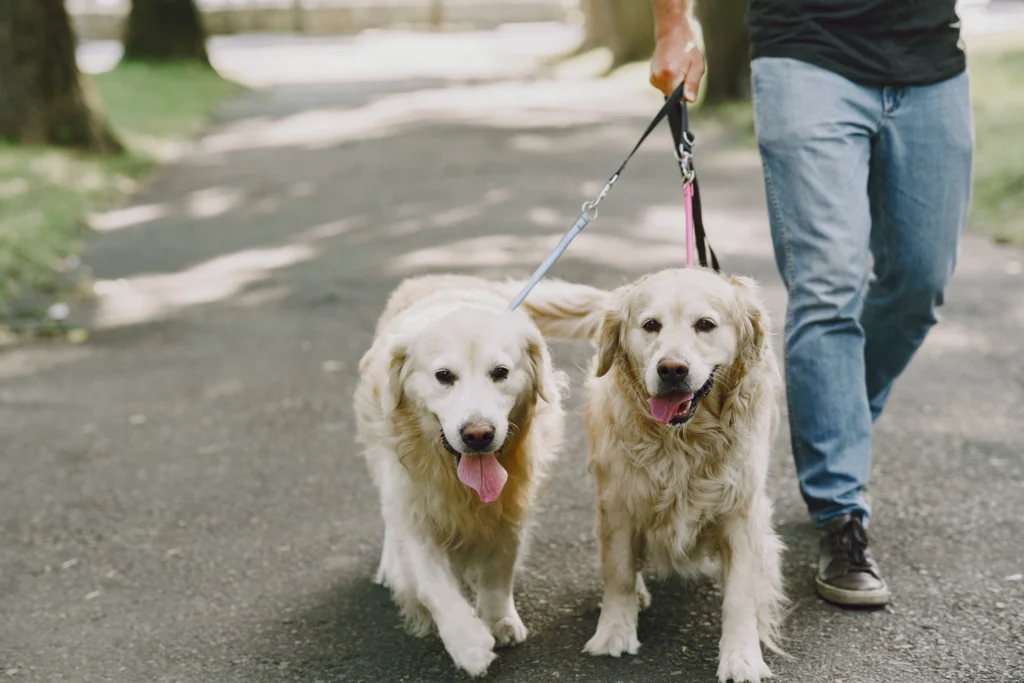
Licensing and Consumer Protection
Tennessee doesn’t have a single set of laws governing dog breeding practices. However, regulations focus on two key areas:
- Licensing Requirements: The Tennessee Companion Animal Welfare Act requires licensing for commercial breeders and dog sellers in the state.
- Consumer Protection: This act aims to protect consumers from unscrupulous breeders and promotes responsible animal ownership practices.
Tennessee Companion Animal Welfare Act
The Tennessee Companion Animal Welfare Act establishes a framework for licensing and regulating animal shelters, rescues, and breeders. Here’s a breakdown of key points for breeders:
- Commercial Breeder Definition: The Act defines a commercial breeder as anyone who possesses or maintains, under their immediate control, 20 or more unsterilized adult female dogs or cats for the purpose of selling the offspring as companion animals.
- Licensing Requirements: Commercial breeders in Tennessee must obtain a license from the Tennessee Department of Agriculture.
- Inspections: Licensed breeders are subject to inspections to ensure adherence to animal welfare standards, including housing, sanitation, veterinary care, and breeding practices.
Reputable Dog Breeders in Tennessee
With numerous breeders in Tennessee, choosing a responsible one is crucial. Here are some tips to find reputable breeders:
- Breeder Reputation: Research the breeder’s reputation, seeking recommendations from veterinarians, breed clubs, or responsible dog owners.
- Facility Conditions: Visit the breeder’s facility to ensure clean, humane living conditions for the breeding dogs and puppies.
- Health Testing: Reputable breeders conduct genetic testing and health clearances for their breeding stock to minimize the risk of hereditary diseases in their puppies.
- Breeder Contracts: A responsible breeder will have a contract outlining the terms of the sale, health guarantees (if applicable), and buyer responsibilities.
Importance of Responsible Breeding
Beyond legal requirements, responsible breeding practices are essential for the health and well-being of dogs. Here are some key aspects:
- Selective Breeding: Responsible breeders select breeding stock based on temperament, health, and conformation to breed standards.
- Genetic Testing: Testing for known genetic disorders in a breed helps breeders avoid passing these issues to future generations.
- Proper Care and Socialization: Breeding dogs should receive proper nutrition, veterinary care, and socialization to ensure healthy puppies with good temperaments.
Avoiding Puppy Mills
Puppy mills are large-scale commercial breeding operations that prioritize profit over the health and well-being of dogs. Here’s how to avoid supporting puppy mills:
- Beware of Low Prices: Extremely low prices for puppies can be a red flag for puppy mills.
- Online Marketplaces: Exercise caution when purchasing puppies online, as some platforms might facilitate sales from puppy mills.
- Directly Meet the Breeder: Meet the breeder in person and visit their facilities to assess the conditions in which the dogs are kept.
Dog Genetics and Breed-Specific Information
When considering a specific breed, knowledge of its inherent traits and potential health concerns is crucial. Here are some resources for researching dog genetics and breed information:
- National Breed Clubs: Many recognized dog breeds have national clubs that offer information on breed standards, health concerns, and responsible breeding practices.
- American Kennel Club (AKC): The AKC provides a comprehensive database of dog breeds with information on temperament, health, and care requirements.
- Online Canine Genetics Resources: Several online resources offer information on canine genetics and breed-specific health concerns.
Considering Adoption as an Alternative
While obtaining a purebred puppy from a responsible breeder can be a rewarding experience, adoption is a noble alternative. Here are some reasons to consider adoption:
- Giving a Homeless Dog a Second Chance: Many shelters and rescues house wonderful dogs of all breeds and ages waiting for loving homes.
- Variety of Breeds: Shelters and rescues often have mixed-breed dogs with unique personalities and temperaments.
- Adoption Costs: Adoption fees are typically significantly lower than purchasing a puppy from a breeder.
Dog Environmental Impact Laws in Tennessee
Tennessee, with its rolling hills, lush forests, and vibrant cities, offers a haven for both humans and their canine companions. Responsible dog ownership extends beyond their physical well-being and includes minimizing their environmental impact. While there aren’t specific laws solely focused on dog waste management, understanding existing regulations and best practices empowers you to be an eco-conscious dog owner in Tennessee.

The Environmental Footprint of Dogs
While our furry friends bring joy and companionship, their impact on the environment shouldn’t be overlooked. Here’s a breakdown of some key environmental concerns related to dogs:
- Waste Management: Undecomposed dog waste can contaminate waterways, harm wildlife, and contribute to unpleasant odors.
- Parasite Control Products: Certain flea and tick medications can contain harmful chemicals that can leach into the soil and water.
- Food Production: Meat-based dog food production necessitates significant resources, including land and water.
Waste Management Regulations
While there isn’t a single, state-wide law mandating dog waste cleanup in Tennessee, most cities and counties have ordinances in place:
- Leash Laws and Poop and Scoop Ordinances: Many localities have leash laws and ordinances requiring dog owners to pick up and dispose of their dog’s waste properly.
- Fines for Non-Compliance: Failure to pick up after your dog can result in fines or citations.
Waste Management Regulations
The specific regulations regarding dog waste management can vary by location. Here’s how to find the details:
- Municipal Website: Most local government websites maintain information on animal control ordinances and waste management regulations.
- Local Parks and Recreation Department: Park rules often mandate leash laws and waste disposal requirements for dog owners.
Responsible Dog Waste Management Practices
Following local regulations is essential, but responsible dog ownership goes beyond legalities. Here are some eco-friendly waste management practices:
- Always Carry Poop Bags: Make it a habit to carry biodegradable poop bags whenever you’re out with your dog.
- Dispose of Waste Properly: Tie up the poop bag securely and dispose of it in designated waste bins.
- Composting Options: Some communities offer composting programs specifically for dog waste.
Minimizing Your Dog’s Environmental Impact
Beyond waste management, there are other ways to minimize your dog’s environmental footprint:
- Parasite Control with Eco-Friendly Options: Consult your veterinarian about eco-friendly alternatives for flea and tick control products.
- Sustainable Dog Food Choices: Consider brands that use sustainable ingredients and packaging for their dog food products.
- Supporting Local Businesses: Opt for dog food and supplies from local businesses to reduce your carbon footprint associated with transportation.
Dog Parks and Environmental Considerations
Dog parks can be fantastic places for dogs to socialize and exercise, but responsible use is crucial for minimizing environmental impact. Here are some tips:
- Respect Designated Waste Disposal Areas: Always pick up after your dog and dispose of waste in designated areas within the park.
- Minimize Water Waste: Be mindful of water usage while filling bowls at dog park water fountains.
- Leave No Trace: Pack out any trash you or your dog generate while at the dog park.
Dog-Friendly Hiking and Outdoor Activities
Tennessee offers various opportunities for dog-friendly hiking and outdoor adventures. Here’s how to ensure your pup enjoys these experiences responsibly:
- Leave No Trace Principles: Adhere to Leave No Trace principles to minimize your and your dog’s impact on the environment.
- Respect Wildlife Habitat: Keep your dog leashed in areas with sensitive wildlife habitats.
- Proper Waste Disposal: Always carry poop bags and dispose of waste properly, even while on hikes or outdoor adventures.
Dog Behavioural Training Laws in Tennessee
Tennessee boasts a vibrant pet culture, with many residents considering their canine companions cherished members of the family. Ensuring your dog exhibits good behavior is crucial for maintaining a harmonious relationship with your pet and your community. While there aren’t specific laws mandating dog training in Tennessee, regulations exist to address nuisance barking and potentially dangerous dogs. This comprehensive guide explores dog behavioral training laws (or the lack thereof) in Tennessee, empowering you to take proactive steps towards a well-behaved canine companion.
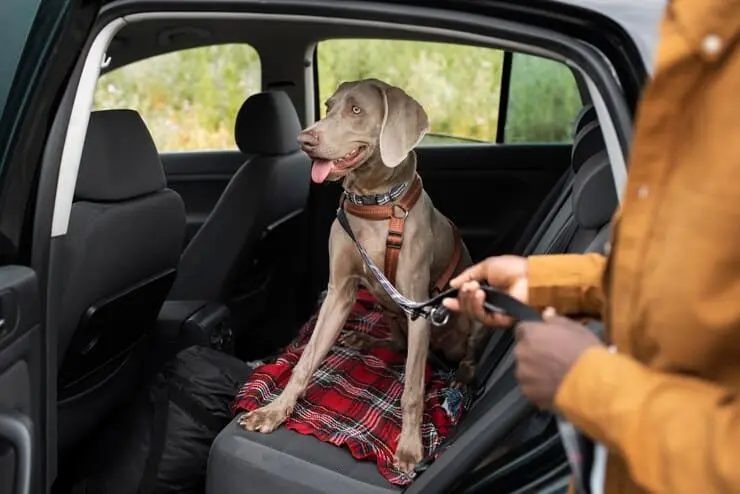
Regulatory Landscape
Tennessee doesn’t have a single set of laws dictating dog behavioral training. Animal control regulations primarily focus on addressing public safety concerns and nuisance behavior:
- Nuisance Barking Ordinances: Many cities and counties in Tennessee have ordinances addressing excessive barking that disrupts the peace and quiet of the neighborhood.
- Dangerous Dog Laws: These laws aim to protect the public from potentially dangerous or aggressive dogs.
Addressing Nuisance Barking
Excessive barking can be a disturbance to neighbors and a source of frustration for dog owners. Here’s a breakdown of key points regarding nuisance barking ordinances:
- Variations in Local Ordinances: Specific definitions of “excessive barking” and enforcement procedures can vary by location.
- Potential Fines: Violations of nuisance barking ordinances might result in fines or citations.
- Addressing the Root Cause: Instead of focusing solely on penalties, responsible dog owners should work on identifying the root cause of excessive barking and implementing positive training techniques.
Dangerous Dog Laws
Dangerous dog laws focus on protecting the public from aggressive or potentially dangerous canines. Here’s what you should know:
- Criteria for Designation: A dog might be declared “dangerous” based on factors like biting attacks, inflicting serious bodily injury, or displaying threatening behavior.
- Leash Laws and Muzzle Requirements: Dangerous dogs might be subject to mandatory leash laws and muzzle requirements when in public spaces.
- Owner Responsibility: Owners of dangerous dogs have a heightened responsibility to ensure their pets are properly contained and pose no threat to the public.
Proactive Training
While nuisance barking and dangerous dog laws exist, they don’t mandate dog behavioral training in Tennessee. The onus falls on dog owners to ensure their pets receive proper training for good behavior:
- Benefits of Positive Reinforcement Training: Positive reinforcement training methods are humane, effective, and build a strong bond between you and your dog.
- Socialization and Early Training: Socialization from a young age and consistent training throughout your dog’s life are crucial for preventing behavioral problems.
- Consulting a Professional Trainer: If you’re facing behavioral challenges with your dog, consider consulting a qualified professional dog trainer for guidance.
Finding a Reputable Dog Trainers
Choosing the right dog trainer is critical for your pet’s well-being and training success. Here are some tips for finding a reputable professional:
- Certification and Experience: Look for trainers with certifications from reputable organizations and experience working with your dog’s breed and specific needs.
- Training Methods: Choose a trainer who utilizes positive reinforcement techniques and prioritizes humane and effective methods.
- Initial Consultation: Schedule a consultation with potential trainers to discuss your dog’s needs and determine if their approach aligns with your values.
Breed-Specific Considerations and Training Needs
Different dog breeds have varying temperaments and energy levels, requiring tailored training approaches. Here’s what to consider:
- Research Your Breed: Learn about the inherent traits and common behavioral tendencies of your dog’s breed.
- Addressing Breed-Specific Challenges: Certain breeds might require training specific to their natural instincts or working abilities.
- Adapting Training Methods: A qualified trainer can design a training program that caters to your dog’s individual needs and breed characteristics.
Building a Happy and Well-Behaved Canine Companion
While legal compliance is essential, responsible dog ownership encompasses more than just avoiding fines. Here’s how to cultivate a well-behaved and happy canine companion:
- Establish Consistent Routines: Provide your dog with consistent routines for meals, walks, and playtime to establish structure and predictability.
- Mental and Physical Stimulation: Engage your dog with daily walks, mental stimulation games, and activities that cater to their energy levels and breed needs.
- Positive Reinforcement and Patience: Positive reinforcement training techniques build trust and strengthen your bond with your dog. Be patient and consistent in your training approach.
Dog Protection and Rescue Laws in Tennessee
Tennessee, with its scenic landscapes and friendly communities, is a haven for both humans and their canine companions. Protecting the well-being of dogs and ensuring they have a safe and secure environment is a shared responsibility. While there isn’t a single, overarching law encompassing all aspects of dog protection and rescue, Tennessee has regulations and resources in place to promote animal welfare and address animal cruelty. This comprehensive guide delves into dog protection and rescue laws in Tennessee, empowering you to be a voice for vulnerable animals.

The Legal Landscape
Tennessee’s legal framework for dog protection centers around preventing and addressing animal cruelty and neglect. Here’s a breakdown of key areas:
- Tennessee Animal Cruelty Laws: These laws define acts of animal cruelty and neglect, outlining penalties for violators.
- Tennessee Department of Agriculture (TDA): The TDA oversees animal welfare enforcement, including investigating cruelty complaints and issuing citations.
- Local Animal Control Agencies: These agencies play a crucial role in responding to animal cruelty calls, rescuing animals in distress, and enforcing animal control ordinances.
Animal Cruelty Laws in Tennessee
Animal cruelty laws in Tennessee aim to safeguard animals from intentional neglect and abuse. Here’s a breakdown of key points:
- Definition of Animal Cruelty: The law defines animal cruelty as intentionally inflicting pain or suffering, failing to provide adequate food, water, shelter, or veterinary care, or abandoning an animal.
- Reporting Requirements: If you suspect animal cruelty, you are legally obligated to report it to your local animal control agency or law enforcement.
- Penalties for Cruelty: Violations of animal cruelty laws can result in fines, jail time, and potential confiscation of the animal.
The Role of the Tennessee Department of Agriculture (TDA)
The TDA plays a vital role in enforcing animal welfare regulations in Tennessee. Here’s how they contribute to dog protection:
- Investigating Cruelty Complaints: The TDA investigates animal cruelty complaints received from the public or animal control agencies.
- Issuing Citations and Penalties: The TDA can issue citations and impose penalties for violations of animal cruelty laws.
- Working with Law Enforcement: The TDA collaborates with law enforcement agencies in investigating severe animal cruelty cases.
The Role of Local Animal Control
Local animal control agencies are often the first responders to animal cruelty cases and play a critical role in dog rescue:
- Responding to Animal Cruelty Calls: Animal control officers respond to calls regarding animal cruelty, neglect, or abandoned animals.
- Impounding Stray and Neglected Dogs: Stray or neglected dogs might be impounded by animal control to protect their well-being and locate their owners.
- Sheltering and Rehoming Rescued Dogs: Animal control agencies provide temporary shelter for rescued dogs and facilitate their adoption into loving homes.
Dog Protection and Rescue
Beyond legal frameworks, responsible citizens have a crucial role in safeguarding dogs. Here’s how you can contribute:
- Report Animal Cruelty: If you suspect animal cruelty, don’t hesitate to report it to the authorities.
- Supporting Animal Shelters and Rescues: Consider volunteering your time, donating resources, or adopting a rescue dog.
- Spreading Awareness: Educate others about responsible dog ownership and the importance of animal welfare.
Reputable Animal Shelters and Rescue Organizations
When considering adopting a rescue dog or supporting animal welfare efforts, choosing a reputable organization is crucial. Here are some tips:
- Research the Organization: Look for shelters and rescues with positive reputations for animal care, adoption practices, and transparency.
- Facility Tours and Volunteer Opportunities: Visit the facility to assess their animal care standards and consider volunteering to see their operations firsthand.
- Adoption Process and Requirements: Review the adoption process and requirements to ensure a good fit for both you and the dog.
Preventing Dog Abuse and Neglect
While dog rescue organizations play a vital role in caring for vulnerable animals, preventing abuse and neglect is critical. Here’s how you can contribute:
- Responsible Ownership: Provide your dog with proper nutrition, veterinary care, training, and socialization to ensure their well-being.
- Spay and Neuter: Spaying and neutering your dog helps control pet overpopulation and reduces the number of animals entering shelters.
- Supporting Responsible Breeders: If considering purchasing a puppy, research reputable breeders who prioritize responsible breeding practices and animal welfare.
Dog Entertainment and Work Laws in Tennessee
Tennessee, with its vibrant cities and scenic landscapes, offers a haven for both humans and their canine companions. Many dog owners enjoy finding activities and occupations that allow their furry friends to showcase their talents and contribute. While specific laws solely focused on dog entertainment and work might not be readily apparent, understanding existing regulations and industry practices empowers you to make informed decisions for your dog’s well-being. This comprehensive guide delves into dog entertainment and work laws in Tennessee, equipping you with the knowledge to navigate these areas responsibly.
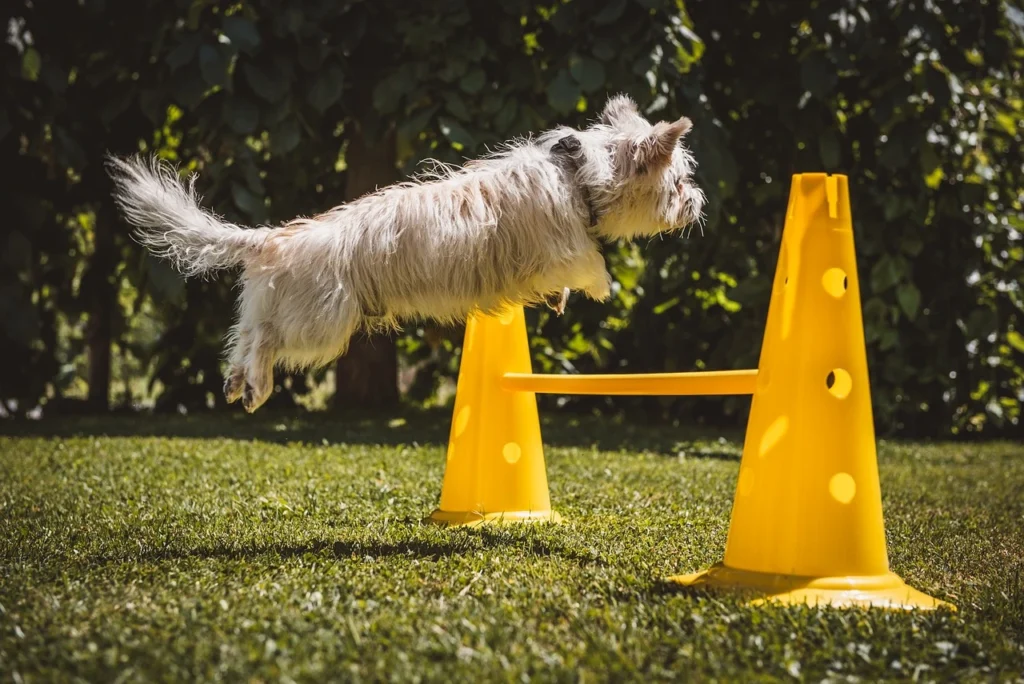
Animal Welfare and Safety
Tennessee’s legal framework doesn’t have a single set of laws specifically dictating dog entertainment and work. However, animal welfare regulations and industry best practices play a crucial role:
- Tennessee Animal Cruelty Laws: These laws provide a foundation for animal welfare by prohibiting acts of cruelty and neglect, ensuring minimum standards of care.
- Industry Standards and Regulations: Different industries involving working or performing dogs might have specific regulations or guidelines established by governing bodies.
The Applicability of Animal Cruelty Laws
Tennessee’s animal cruelty laws serve as a cornerstone for protecting dogs in any capacity, including entertainment and work. Here’s what you should know:
- Definition of Cruelty: The law defines animal cruelty as intentionally inflicting pain or suffering, denying proper food, water, shelter, or veterinary care.
- Application to Dog Entertainment and Work: These laws apply to any situation where a dog is involved in entertainment or work activities. Activities must not cause undue stress, exhaustion, or injury to the dog.
- Reporting Requirements: If you suspect a dog is being mistreated in an entertainment or work setting, you are legally obligated to report it to your local animal control agency.
Exploring Responsible Practices
Dog entertainment activities like participating in dog shows, agility competitions, or even pet therapy can be enriching for both dogs and humans. Here’s how to ensure responsible participation:
- Breed Suitability: Choose activities that suit your dog’s breed, temperament, and physical limitations.
- Prioritization of Well-Being: The dog’s well-being should be the top priority. Training methods should be positive, and dogs should be given ample rest breaks and access to water.
- Industry Regulations and Certifications: Certain dog entertainment activities might have specific regulations or certifications for handlers and trainers. Research these before participating.
Balancing Productivity with Well-Being
Dogs play valuable roles in various sectors like search and rescue, law enforcement, and service animals. Here’s how to ensure their well-being at work:
- Breed Selection and Training: Working dogs should be carefully selected based on their breed’s inherent skills and undergo specific training to excel in their roles.
- Proper Handling and Care: Handlers of working dogs need proper training to ensure humane handling and provide appropriate care, including rest, nourishment, and veterinary attention.
- Industry Standards and Regulations: Different work sectors might have established regulations regarding working dog breeds, training requirements, and handler qualifications.
Reputable Organizations for Dog Entertainment and Work
If you’re considering involving your dog in entertainment or work activities, choosing reputable organizations is crucial. Here are some tips:
- Research the Organization’s Reputation: Seek recommendations and research the organization’s practices and commitment to animal welfare.
- Observe Dog Handling and Training Techniques: Observe how dogs are handled and trained, ensuring positive reinforcement methods are used.
- Focus on Your Dog’s Comfort and Well-being: Always prioritize your dog’s comfort level and well-being. Don’t force them to participate in activities they dislike.
Responsible Practices for Dog Entertainment and Work
While legal compliance is essential, responsible dog ownership extends beyond the minimum requirements:
- Understanding Your Dog’s Limits: Recognize your dog’s physical and mental limitations. Avoid activities that could lead to exhaustion, injury, or stress.
- Prioritize Regular Veterinary Care: Ensure your working or performing dog receives regular veterinary checkups and preventive care to maintain optimal health.
- Building a Strong Bond Through Positive Reinforcement: Train your dog using positive reinforcement techniques to build trust and create a positive association with work or entertainment activities.
Dog Technology and Innovation Laws in Tennessee
Tennessee, with its rolling hills and bustling cities, is a haven for both humans and their canine companions. As technology continues to evolve, innovative pet tech products and advancements in dog health are revolutionizing the way we care for our furry friends. While there aren’t specific laws directly regulating pet tech products in Tennessee, understanding existing regulations and industry trends empowers you to make informed decisions regarding these innovations for your dog. This comprehensive guide delves into dog technology and innovation laws in Tennessee, equipping you with the knowledge to navigate this exciting frontier responsibly.

Animal Welfare and Consumer Protection
Tennessee’s legal framework doesn’t have a single set of laws specifically targeting dog technology and innovation. However, existing regulations and industry considerations play a crucial role:
- Tennessee Animal Cruelty Laws: These laws provide a foundation for animal welfare by prohibiting acts of cruelty and neglect, ensuring minimum standards of care.
- Federal Regulations for Pet Products: The Federal Food, Drug, and Cosmetic Act (FD&C Act) by the U.S. Food and Drug Administration (FDA) regulates the safety and effectiveness of pet products, including some technological advancements.
- Industry Standards and Emerging Guidelines: As dog technology evolves, industry standards and best practices might be developed to ensure product safety and responsible use.
Animal Cruelty Laws
Tennessee’s animal cruelty laws are fundamental in protecting dogs from harm, including those potentially associated with new technologies. Here’s what you should know:
- Definition of Cruelty: The law defines animal cruelty as intentionally inflicting pain or suffering, denying proper food, water, shelter, or veterinary care.
- Application to Dog Technology: Animal cruelty laws apply to any situation where dog technology could potentially cause harm. Safety considerations for these products are crucial.
- Reporting Requirements: If you suspect a dog tech product is causing harm to your dog, you are obligated to report it to the authorities and potentially the manufacturer.
Different Dog Technology Categories
The realm of dog technology encompasses a wide range of products and innovations. Here’s a breakdown of some key categories:
- Wearable Tech: These products include GPS trackers, activity monitors, and even smart collars that monitor vital signs.
- Telehealth and Remote Veterinary Care: Emerging technologies allow for virtual consultations with veterinarians and remote monitoring of a dog’s health.
- Interactive Training Tools: Tech-based training tools can utilize games, puzzles, and even clicker training methods through interactive devices.
- Automatic Feeders and Water Dispensers: These tech-enabled products automate food and water dispensing for your dog, promoting portion control and convenience.
Regulatory Landscape for Pet Tech Products
While Tennessee doesn’t have specific laws for pet tech products, the FDA plays a vital role:
- FDA Regulation of Pet Products: The FDA classifies pet tech products based on their intended use and potential risks. Some products might require pre-market approval by the FDA for safety and effectiveness.
- Consumer Research and Due Diligence: Before using new dog technology, research the product thoroughly. Look for FDA approval (if applicable) and reviews from reputable sources.
Finding Reputable Pet Tech Products and Companies
With the growing pet tech market, choosing reliable products and companies is crucial. Here are some tips:
- Look for Established Brands: Opt for products from established brands with a reputation for safety and quality.
- Research Product Testing and Reviews: Look for independent product reviews and information on safety testing conducted by the manufacturer.
- Consult Your Veterinarian: Discuss your interest in dog technology with your veterinarian. They can offer guidance on appropriate products for your dog’s specific needs.
Prioritizing Animal Welfare in Innovation
As dog technology advances, prioritizing animal welfare remains paramount:
- Focus on Products that Enhance Well-Being: Choose dog tech products that improve your dog’s health, safety, or overall well-being.
- Responsible Use and Training: Ensure proper training and supervision when using any dog technology product.
- Monitoring for Potential Issues: Be observant of your dog’s behavior when using new technology. If you notice any signs of discomfort or distress, discontinue use and consult your veterinarian.
Human Coexistence Laws in Tennessee
Tennessee, with its vibrant cities and scenic landscapes, offers a haven for both humans and their canine companions. Fostering a harmonious coexistence between dogs and their humans is essential for a happy and fulfilling relationship. While there aren’t specific laws directly mandating dog-human bonding activities, Tennessee has regulations and initiatives that indirectly promote responsible ownership and positive interactions. This comprehensive guide explores the legal landscape surrounding human-canine coexistence in Tennessee, empowering you to cultivate a strong and lasting bond with your furry friend.

Responsible Ownership and Animal Welfare
Tennessee’s legal framework establishes the foundation for human-canine coexistence through animal welfare regulations. Here’s a breakdown of key areas:
- Tennessee Animal Cruelty Laws: These laws define acts of cruelty and neglect, ensuring minimum standards of care are provided for dogs. Responsible ownership forms the basis for a positive human-dog relationship.
- Leash Laws and Public Access: Many cities and counties in Tennessee have leash laws mandating dogs be leashed in public spaces. This promotes public safety and allows responsible dog owners to enjoy outings with their canine companions.
- Breed-Specific Legislation (BSL) Considerations: While uncommon in Tennessee, some localities might have breed-specific legislation (BSL) restrictions. Research local regulations if considering specific dog breeds.
Animal Cruelty Laws and Responsible Ownership
Tennessee’s animal cruelty laws are a cornerstone for humane treatment of dogs, fostering a foundation for positive human-canine coexistence:
- Definition of Cruelty: The law defines animal cruelty as intentionally inflicting pain or suffering, denying proper food, water, shelter, or veterinary care.
- Promoting Responsible Ownership: Responsible ownership practices like proper nutrition, veterinary care, training, and socialization contribute to a dog’s well-being and build a strong bond with their human.
- Reporting Requirements: If you suspect animal cruelty, you are legally obligated to report it to the authorities, ensuring the dog’s safety and promoting responsible coexistence.
Initiatives Promoting Human-Canine Bonding
While legal frameworks provide a foundation, various initiatives encourage dog-human bonding in Tennessee:
- Dog-Friendly Parks and Recreation Areas: Many parks and recreation areas in Tennessee allow responsible dog owners to enjoy outdoor activities with their furry friends.
- Dog Training and Behavior Modification: Positive reinforcement training methods foster strong connections between dogs and their human companions.
- Volunteer Opportunities with Dogs: Shelters and rescue organizations offer opportunities to volunteer with dogs, promoting positive interactions and building bonds.
Dog-Friendly Parks and Activities
Tennessee boasts numerous dog-friendly parks and outdoor spaces perfect for enjoying quality time with your canine companion. Here’s how to find them:
- Municipal Websites and Park Regulations: Most local government websites maintain information on dog parks and recreation areas, including leash laws and access guidelines.
- Online Directories and Reviews: Online directories and review platforms can help you locate dog-friendly parks, trails, and businesses in your area.
- Apps and Social Media Groups: Mobile apps and social media groups dedicated to dog owners can provide valuable insights on dog-friendly spaces and activities.
The Importance of Positive Reinforcement Training
Positive reinforcement training methods are key to building a strong and lasting bond with your dog:
- Reward-Based Techniques: Positive reinforcement training uses rewards like treats, praise, or playtime to encourage desired behaviors and build trust.
- Understanding Your Dog’s Needs: Tailor your training approach to your dog’s individual needs, breed characteristics, and learning style.
- Building a Positive Relationship: Positive reinforcement training strengthens the bond between you and your dog, promoting joyful coexistence.
Volunteering with Dogs and Animal Welfare Organizations
Volunteering with dogs at shelters or rescue organizations offers a rewarding way to build human-canine connections:
- Socialization and Enrichment for Shelter Dogs: Volunteering provides essential socialization opportunities for shelter dogs, enhancing their well-being and preparing them for adoption.
- Building Bonds Through Positive Interactions: Helping dogs in need and building positive relationships with them fosters empathy and promotes responsible coexistence.
- Supporting a Cause You Care About: Volunteering at animal welfare organizations allows you to contribute to the well-being of dogs while fostering positive interactions.
Additional Considerations
Beyond legal frameworks and initiatives, responsible dog ownership practices encourage positive coexistence:
- Understanding Dog Behavior and Body Language: Learning to read your dog’s body language helps you understand their needs and respond accordingly.
- Providing Mental and Physical Stimulation: Regular exercise, playtime, and mental stimulation activities keep your dog mentally and physically healthy, promoting a positive bond.
Other Relevant Dog Laws in Tennessee
While Tennessee doesn’t offer legal benefits directly tied to Canine Good Citizen (CGC) certification, completing a CGC program can be advantageous for dog owners:
- Reduced Homeowner’s Insurance Rates: Some insurance companies might offer discounts on homeowner’s insurance for dogs who have completed CGC programs.
- Apartment Rentals: Landlords in dog-friendly apartments might favor applicants with well-trained dogs, and CGC certification can demonstrate your dog’s good behavior.
- Reduced Fees at Dog Boarding Facilities: Some boarding facilities might offer lower rates for dogs with CGC certification.
Dog Insurance and Coverage Laws in Tennessee
Tennessee doesn’t have specific laws mandating dog insurance. However, dog insurance can be a valuable financial safeguard for unexpected vet bills:
- Coverage Options: Dog insurance policies can cover accidents, illnesses, and even routine vet care, depending on the plan you choose.
- Financial Protection: Dog insurance can help offset the high costs of veterinary care, providing peace of mind for dog owners.
- Researching Insurance Providers: Compare different dog insurance providers in Tennessee to find a plan that fits your budget and coverage needs.
Laws Regarding Dogs in Hot Cars and Animal Endangerment in Tennessee
Tennessee has laws against animal cruelty and neglect, which encompass leaving a dog in a hot car:
- Animal Cruelty Laws: Leaving a dog unattended in a hot car can be considered animal cruelty, resulting in fines and potential animal confiscation.
- Heatstroke Risks: Dogs are highly susceptible to heatstroke in hot cars, which can be fatal.
- Alternatives: Never leave your dog unattended in a hot car. If you must leave your dog briefly, find air-conditioned pet care or shady outdoor areas with ample water.
Legal Aspects of Dog Parks and Shared Spaces in Tennessee
Leash laws and park regulations govern dog use of shared spaces in Tennessee:
- Leash Laws: Most cities and counties in Tennessee have leash laws requiring dogs to be leashed in public spaces, including parks.
- Dog Park Regulations: Dog parks often have specific rules regarding dog behavior, size limitations, and proper waste disposal.
- Responsible Dog Ownership: Dog owners are responsible for their pets’ behavior in shared spaces, ensuring a safe and enjoyable experience for everyone.
Dog-Related Property Damage and Homeowner’s Insurance in Tennessee
Tennessee homeowner’s insurance policies typically cover dog-related property damage to your own property with limitations:
- Coverage for Damage: Most policies cover damage caused by your dog to your own home, with potential exclusions for things like chewing or scratching.
- Liability Coverage: Homeowner’s insurance might also offer liability coverage for damage your dog causes to someone else’s property.
- Reviewing Your Policy: Carefully review your homeowner’s insurance policy to understand the coverage details regarding dog-related damage.
Service and Working Dog Laws in Employment and Public Access in Tennessee
Tennessee adheres to the Americans with Disabilities Act (ADA) regarding service animals:
- Definition of Service Animals: The ADA defines service animals as dogs trained to perform specific tasks to assist people with disabilities.
- Public Access Rights: Service animals are legally allowed to accompany their disabled handlers in most public spaces and workplaces.
- Emotional Support Animals (ESAs): ESAs are not covered by the ADA but might be allowed in housing situations with proper documentation.
Animal Welfare and Protection Laws Against Neglect and Abandonment in Tennessee
Tennessee has animal cruelty and neglect laws to protect dogs:
- Definition of Neglect: Neglect can include failing to provide adequate food, water, shelter, or veterinary care.
- Abandonment: Abandoning a dog is illegal in Tennessee.
- Reporting Requirements: If you suspect animal neglect or abandonment, you are legally obligated to report it to your local animal control agency.
This comprehensive guide explored Tennessee’s legal landscape and best practices regarding dog protection, entertainment, work, technology, and human-canine coexistence.
Understanding animal cruelty laws, responsible ownership principles, and industry regulations empowers you to make informed decisions for your dog’s well-being. Compliance with dog laws isn’t just about avoiding penalties; it’s about creating a safe and enriching environment for dogs, fostering positive human-canine bonds, and contributing to a society that respects animal welfare.
By working together, dog owners, industry professionals, and lawmakers can ensure a bright future where dogs can thrive alongside their human companions.
FAQs
Can I take my dog swimming in public lakes or rivers in Tennessee?
There are no statewide laws prohibiting dogs from swimming in public waterways in Tennessee. However, individual municipalities or park authorities might have specific regulations regarding dogs in lakes, rivers, or beaches. It’s always best to check with local authorities before letting your dog swim in a public waterway.
Are there any restrictions on breeding dogs in Tennessee?
Tennessee doesn’t have specific laws regulating dog breeding at the state level. However, some localities might have ordinances regarding kennel licenses or limitations on the number of breeding dogs allowed per property. It’s advisable to check with your local government for any breeding restrictions.
What are the قوانين (qawaanin – Arabic for “laws”) regarding traveling with my dog on airplanes in Tennessee?
While Tennessee doesn’t have laws regarding air travel with dogs, airlines have their own pet policies and regulations. These policies cover everything from crate size requirements to breed restrictions and temperature limitations. Always research the specific airline’s pet travel policy before booking a flight with your dog.
Can my landlord restrict dog breeds in my apartment building?
Yes, in Tennessee, landlords can restrict certain dog breeds in their rental properties. This practice, known as Breed-Specific Legislation (BSL), is not uncommon in some apartment complexes. Before signing a lease, be sure to review the pet policy, which will outline any breed restrictions or limitations on the size or number of dogs allowed.
What should I do if I find a lost dog in Tennessee?
If you find a lost dog in Tennessee, here are the recommended steps:
Secure the dog safely: Try to leash the dog or confine it in a safe place to prevent it from running away.
Check for identification tags: Look for ID tags on the dog’s collar. Contact information for the owner might be listed.
Report the lost dog to animal control: Contact your local animal control agency and report the lost dog, providing details about its breed, size, and any collar markings.
Take the dog to a shelter or veterinarian: If unable to locate the owner through ID tags, consider taking the dog to a local animal shelter or veterinarian. They might have a microchip scanner to identify the owner.

